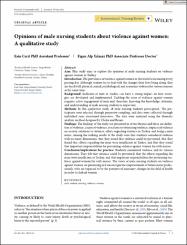Opinions of male nursing students about violence against women: A qualitative study
Özet
Aim This study aims to explore the opinions of male nursing students on violence against women in Turkey. Introduction The prevalence of violence against women in the world is increasing every passing day. Although women try to deal with the changes their lives bring along, they are faced with physical, sexual, psychological, and economic violence for various reasons at the same time. Background Inclusion of men in studies can have a strong impact on how strategies are developed and implemented. Tackling the issue of violence against women requires active engagement of men and, therefore, knowing the knowledge, attitudes, and understanding of male nursing students is important. Methods In this qualitative study, 18 male nursing students participated. The participants were selected through purposive sampling, and data were collected through individual semi structured interviews. The data were analyzed using the thematic analysis method designed by Clarke and Braun. Findings The findings of the study are presented in seven themes and these are definition of violence, causes of violence, reactions to witnessing violence, impacts of violence on society, solutions to violence, efforts regarding violence in Turkey, and being a male nurse. Among the striking results of the study were that students considered violence with its many dimensions, that they stated that violence could be prevented, that they found that efforts regarding the issue were insufficient in Turkey, and that they stated that important responsibilities for preventing violence against women lay with nurses. Conclusion/implications for practice Students considered violence and its various dimensions. They felt that violence could be prevented, that the efforts regarding the issue were insufficient in Turkey, and that important responsibilities for preventing violence against women lay with nurses. The views of male nursing students on violence against women are promising as it encourages the empowerment of future nurse professionals, who are expected to be the pioneers of necessary changes in the field of health in order to defend women


















